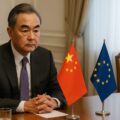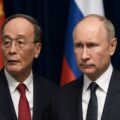
Why foreign direct investment in China is falling: key reasons and the impact on the global economy in 2025
The latest report from China’s Ministry of Commerce confirmed: in 2025, the country faced the deepest decline in foreign direct investment (FDI) inflows since modern records began. In the first half of the year, utilized FDI fell by 15.2% compared to the same period in 2024, amounting to 423.23 billion yuan (about $59 billion). The total for 2024 was even more dramatic: a 27.1% drop to 826.25 billion yuan. This is the lowest level since 2008, when detailed statistics were first published.
The manufacturing sector attracted 109.06 billion yuan, while the services sector accounted for 305.87 billion yuan. However, these figures cannot mask the broader trend: Western capital is being withdrawn, and the investment structure is shifting.
The decline in FDI is not a coincidence, but a direct result of global value chain redistribution and rising political competition between China and the leading Western economies. Since 2022 and especially after escalated sanctions and new restrictions on technology transfers in 2023-2024 companies from the US, the EU, and their allies have shifted production and capital to alternative markets such as India, Vietnam, and Mexico.
Economist Ting Lu of Nomura highlights:
“The main factor is the loss of investor confidence. They are concerned about regulatory shocks and geopolitical risks.”
This has resulted in a “de-risking” policy, where Western companies minimize their dependence on any single market.
Regulatory Uncertainty and Tightening Controls
Another key factor is China’s tougher regulatory approach: tighter controls on financial flows, new cybersecurity requirements, data export restrictions, and fines for tech and education companies. As international trade expert Louisa Liu (Wall Street Journal) notes:
“Uncertainty around rules, fines, new cybersecurity laws and restrictions on data exports are driving investors away.”
While China aims for self-reliance, for Western capital this means greater uncertainty and higher risks.
Slowing Economic Growth and Structural Challenges
China’s economy is losing momentum: in 2024, GDP growth slowed to 5.2%, and this downward trend continued into the first half of 2025. Key challenges include municipal debt, the ongoing real estate crisis (Evergrande, Country Garden), weakening housing demand, and pressure on small and medium-sized businesses.
Zhang Jun, a professor of economics at Peking University, underscores:
“Even liberalizing conditions for foreign business will not deliver results without trust and predictability.”
Post List
Who Still Invests? Segmented Interest Remains
Against the backdrop of falling FDI, several countries ASEAN states, Switzerland, Japan, the United Kingdom, South Korea, and Germany have actually increased their investment in China. In the first half of 2025, for example:
- ASEAN: +8.8%
- Switzerland: +68.6%
- Japan: +59.1%
- United Kingdom: +37.6%
- South Korea: +2.7%
- Germany: +6.3%
This is mainly due to profit reinvestment by subsidiaries (not large new projects) and targeted activity in specific sectors: IT services, pharmaceuticals, battery production, chemicals.
As the latest KPMG report puts it, “The future of FDI in China is not ‘mass inflow’ but a segmented interest in industries with high added value.”
What the Chinese Authorities Say and How Business Responds
The Ministry of Commerce of the People’s Republic of China has officially acknowledged the problem, stating that it is “working to create a more favorable investment environment.” However, even a range of new initiatives tax breaks, pilot zones, simplified dividend repatriation have not restored the confidence of global players.
“We are working to create a more favorable investment environment, but challenges remain due to the international situation,” reads the ministry’s statement.
Western corporations are postponing or reconsidering expansion plans, and major investment funds are lowering their growth forecasts for the Chinese market.
Is China No Longer a Magnet for Western Investors?
The decline in FDI in 2024-2025 is not temporary turbulence, but a systemic challenge for China as a global investment center.
Geopolitics, trust, and structural reform have come to the fore, and the government is being forced to address issues that extend beyond pure economics.
For international business, China remains a market of opportunity but no longer a market of “guaranteed growth,” rather, one of selective interest. Regulatory risks, heightened tensions with the West, and policy uncertainty are limiting the influx of new large investors.
The era of easy FDI in China is over. The long-term consequences will depend not only on Beijing’s decisions, but on the new global economic balance.















